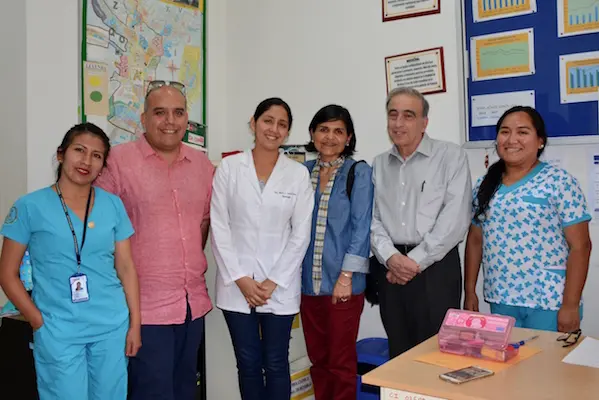Pilot Program Rollout Aligns With World TB Day

03/21/2018
By Karen Angelo
UMass Lowell public health and computer science researchers are launching the pilot of a new tool in Peru that aims to speed up the diagnosis of people afflicted with tuberculosis (TB).
Rather than waiting two or three weeks for a diagnosis, people who are infected will know the results right away. This will reduce the transmission of TB to others, and patients could start taking medication right away.
The curable bacterial infection kills 1.7 million people per year globally, according to the World Health Organization. The Centers for Disease Control and Prevention reports that 9,272 tuberculosis cases were reported in the U.S. from all 50 states in 2016.
The April rollout of the new system in health care clinics in Carabayllo and Ate, districts of Lima, Peru, aligns with World TB Day. March 24 commemorates the date in 1882 when Dr. Robert Koch announced his discovery of Mycobacterium tuberculosis, the bacillus that causes tuberculosis.
Developed with input from U.S. and Peruvian physicians, clinicians and other public health community members, the system includes a smartphone and a tablet that are connected to cloud-computing servers. The researchers developed and trained computational neural networks that automatically analyze and enhance X-ray chest images so that any telltale signs of active TB show up more clearly.
Nurses and health care workers at remote TB clinics will capture and process images of film chest X-rays. A pulmonary specialist, who will log into the server remotely to view the images, will make the final diagnosis.
After the six-month pilot, the researchers will analyze the data, update the computational models and evaluate interventions. If all goes well, they expect to roll out the system in early 2019.
The interdisciplinary team includes Assoc. Prof. Maria Brunette of public health and Prof. Benyuan Liu and Assoc. Prof. Yu Cao, both of computer science. They are collaborating with Dr. John Bernardo of Boston University and several local stakeholders in Lima, including the Ministry of Health TB National Program, Partners in Health Peru and one of the leading medical schools in the country, the University Cayetano Heredia.
The project is funded by a four-year, $1.3 million grant from the National Institutes of Health and the National Science Foundation through the interagency program Smart and Connected Health.
